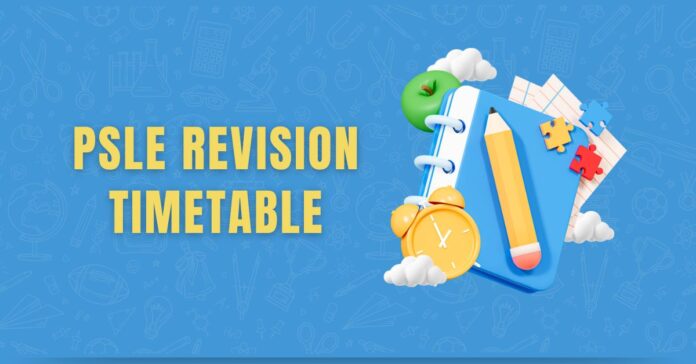Preparing for the PSLE can be both exciting and nerve-wracking for students and parents alike. One of the best ways to reduce stress and improve learning outcomes is by creating a well-structured revision timetable. With the right approach, students can manage their time effectively, revise all subjects systematically, and build the confidence needed to excel in their PSLE exams. In this blog, we’ll guide you through practical steps to craft an efficient study schedule, ensuring a smooth and focused journey to success in the PSLE.
1. Assess the Subjects and Topics to Cover
Start by listing all the subjects tested in the exam. This includes English, Mathematics, Science, and Mother Tongue. Under each subject, identify the topics that need more attention and those you are already confident in. This will help in allocating time based on your current strengths and weaknesses.
-
Break down each subject into bite-sized topics
-
Prioritize the topics you find most challenging
-
Consider the weightage of each topic in the exam
2. Set Realistic Study Goals
A good timetable starts with setting achievable goals. Aim for daily or weekly targets, such as finishing a topic or completing a practice paper. These goals should be clear, measurable, and aligned with the timeline you have until the exams.
-
Avoid vague goals like “study science”
-
Use specific targets like “complete Science MCQ Paper 1 from past year paper”
-
Include short-term and long-term goals
3. Allocate Time Blocks Wisely
Time-blocking helps students focus on one task at a time. Allocate specific time slots for each subject and make sure to mix different PSLE subjects throughout the day. This avoids burnout and keeps the mind fresh.
-
Use 25 to 45-minute study sessions
-
Insert 5 to 10-minute breaks in between
-
Reserve longer sessions for tougher subjects
4. Balance Study and Rest
While preparing for the PSLE is crucial, students need to avoid overworking themselves. A balance of study and rest ensures better retention and mental well-being. Include leisure activities and family time in the schedule.
-
Schedule breaks after every 2 hours of study
-
Ensure 8 to 9 hours of sleep each night
-
Include physical activities like walking or cycling
5. Make It Visual and Easy to Follow
Create a timetable that is clear, colorful, and easy to read. Use digital planners, printable templates, or whiteboards. A visually appealing schedule motivates students to stick to their plan.
-
Use different colors for different subjects
-
Add tick boxes to track completed tasks
-
Pin the timetable where it’s easily visible
6. Review and Adjust Weekly
A revision timetable should be flexible. Review the plan at the end of each week to check your progress and make adjustments. If a certain topic took longer than expected, shift things around.
-
Conduct weekly self-assessments
-
Update the plan based on upcoming tests
-
Be honest about what is working and what’s not
7. Include Past Year Papers and Mock Tests
Practicing with real exam questions is essential. Incorporate mock tests into your timetable to simulate exam conditions. This will help improve time management and reduce exam-day anxiety.
-
Schedule at least one mock test every weekend
-
Include time for going through the answers
-
Focus on both speed and accuracy
8. Keep Motivation High
Sticking to a study plan for weeks can be tough. Keep the energy going by rewarding yourself after completing study goals. Whether it’s a small treat, a break, or a fun activity, these mini-rewards go a long way.
-
Use a reward system to celebrate milestones
-
Stay positive and encourage progress
-
Share successes with family for extra support
9. Avoid Common Timetable Mistakes
Students often make mistakes like over-scheduling or not including breaks. Keep the plan realistic and sustainable. An effective timetable balances all aspects of student life.
-
Don’t cram too many subjects in one day
-
Avoid skipping meals or sleep for study
-
Revisit and fine-tune the plan regularly
Conclusion
Creating an effective revision timetable is a key part of preparing for the PSLE. It helps students stay organized, reduces stress, and boosts confidence. By following the steps above, students can craft a plan that works for them and makes revision productive and less overwhelming. Remember, the goal is not just to study hard, but to study

